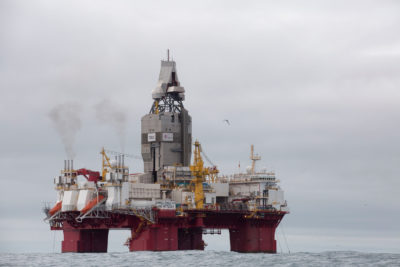The vast majority of Norway’s top and mostly liberal politicians welcomed the news this week that Joe Biden finally has been officially elected as the next US president. Most, however, are not at all keen on his proposal to stop oil drilling in the Arctic.

Biden has said he intends to make climate issues a top priority for the US and other members of the Arctic Council, billed as the leading intergovernmental forum promoting cooperation in the Arctic. Its members include all countries with Arctic territory, including the US, Canada, Denmark, Iceland, Norway, Sweden, Finland and Russia. Permanent participants include organizations representing indigenous peoples in the Arctic.
Biden is calling, in his climate plan for the US, for a moratorium against offshore oil exploration in the Arctic. He also wants to extend his proposed temporary ban on oil drilling internationally, and seeks cooperation from Norway and the rest of the Arctic Council’s eight members.
The Norwegian government, however, has just offered licenses for oil drilling on 136 new oil fields in the Arctic, mostly in the Barents Sea. The new licensing round is just as controversial as earlier rounds, even met with fury by environmental organizations and a few small environmentally oriented parties in Parliament such as the Greens and the Socialist Left. A majority in Parliament including both the Conservative, Progress, Labour and Center parties all support it, however, noting how important the oil industry is for jobs and the economy, and how important the Arctic has and can still be for the industry. Norwegian Broadcasting (NRK) reported last week that nearly half of Norway’s oil and gas reserves are believed to lie under the Barents’ sea floor, and that’s where more oil revenues can be generated over the next several decades.
Norway already under pressure over Arctic oil
The Arctic is especially sensitive, however, and most scientists warn against further exploitation of the area. They worry not only about the potential for pollution and other environmental damage but mostly that even more sources of oil and gas will create even more carbon emissions that can keep the world, not just Norway, from meeting climate goals.
Biden isn’t the only one now putting pressure on Norway to cut back on its oil and gas production. The government faces warnings from the United Nations, has been scolded by huge demonstrations by school children, sued by environmental and a grandparents’ organization and just lost its top spot on the UN Development Programme’s Human Development Index because of its large carbon footprint. Denmark banned more oil exploration in its waters last week and vows to dismantle its oil industry over the next 30 years. Norwegian environmental organizations immediately demanded that Norway do the same.
Now even some oil companies are losing interest in the Arctic because it’s an expensive place to drill, conditions are harsh and risks high. Norwegian tax incentives can cover up to 78 percent of exploration costs if wells come up dry, with newspaper Aftenposten reporting last week the state paid out NOK 3.9 billion to 18 companies last year alone. Criticism is rising that Norway’s promotion of its Arctic territory can become expensive for taxpayers, with the money better spent on carbon capture and storage programs.
Norway’s own state oil company Equinor, meanwhile, has given up some of its oil exploration licenses in the Barents because disappointing results. Newspaper Dagens Næringsliv (DN) reported last month how Equinor has since said it was “shifting focus” in the Barents to exploring in known areas near existing oil fields and infrastructure. Equinor doesn’t see any potential in the Barents southeast, where former oil ministry officials are suspected of undermining experts’ warnings of lower reserves than expected.
Need to define the Arctic
With oil prices moving back up again recently, and the oil lobby powerful, Norwegian officials have no plans for dropping efforts in the Arctic. They also claim that oil activity in the Barents is important from a defense perspective as well: Russian aggression can be more easily fended off if there’s activity in the area.
While Norway’s Greens Party hailed Biden’s proposed moratorium and was ready to propose one in Parliament. Espen Barth Eide, a Member of Parliament and environmental policy spokesman for the Labour Party, was less enthusiastic. He also wants to make climate the top priority at the Arctic Council, but he cautions that the US’ Arctic areas and Norway’s Arctic areas are very different.
“The Arctic is technically everywhere north of the Arctic Circle,” Eide noted. In North America it’s a pretty forbidding place, while in Norway, the gulf stream makes much of the Arctic open, arable and full of thriving communities. Most of Nordland and all of Troms og Finnmark lie well above the Arctic Circle and the Barents Sea is open water up to and even beyond Svalbard.
“We have to first clarify what Arctic Biden is talking about,” Eide told NRK. “A ban couldn’t apply to all our offshore areas n the Norwegian and Barents seas, but there can be a common goal to protect large areas of the Arctic.”
Tony Christian Tiller, state secretary for the Conservatives in the oil ministry, claimed Norwegian policy for the Barents was firm regardless of Biden’s proposal. He thinks it’s too early to comment on exactly what plans Biden may have for the Arctic, or how they’d affect Norway’s.
“Norway has engaged in petroleum activity in our most northerly seas for more than 40 years in a safe and secure manner,” Tiller claimed. “We have just opened up new exploration areas in the Barents. As the world looks now, there’s still all reason to believe that we will continue to have activity in the Barents for many years ahead.”
NewsInEnglish.no/Nina Berglund

